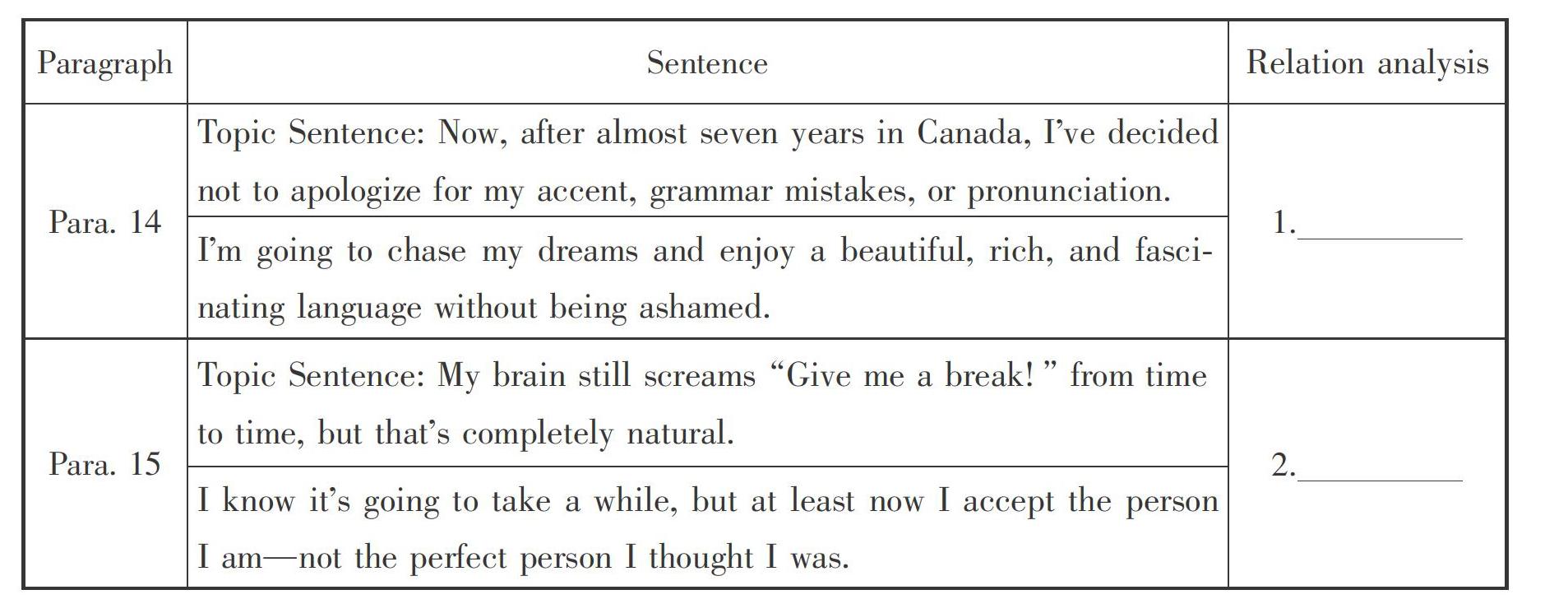The road to fluent English 流利英语路
2021-11-01


Growing up in Venezuela, I never had really much cause to learn English.
For years I knew nothing past “hello”, until I started high school. For five years, I spent two hours a week immersed in understanding the verb “to be”, “numbers”, “colors”, and the di?fference between saying “good evening” and “good night”.
I thought two hours a week was enough time to invest in learning a foreign language. I would always get top marks, and my teachers would regularly praise me.
Even as an adult, I still thought I spoke the language, just by understanding English menus or translating common phrases.
Yep, that used to be me, walking like a queen among everyday Spanish speakers.
“Bring it on, life,” I said.
“I can handle whatever youve got; Im a rock star.” But when I moved to Canada, life hit me so hard that it knocked me down. Years later, I am still recovering.
Living in a new land, with different people, new rules, new weather, a new culture and language, I was no longer a queen.
Did I speak English?
No, not at all.
So, I went back to school, thinking that it was a challenge I would conquer in record time. But the reality was different. English was more like a solid wall in my path.
Even after getting a job, it took all my courage to stop myself from hiding in the washroom during my lunch break, crying, completely overwhelmed (不知所措的) and scared.
Learning English, speaking, listening—it hurt me. Not the language. Not the unkind people. It hurt because I wasnt good, despite my efforts.
Now, after almost seven years in Canada, Ive decided not to apologize for my accent, grammar mistakes, or pronunciation. Im going to chase my dreams and enjoy a beautiful, rich, and fascinating language without being ashamed.
Dont get me wrong. My brain still screams “Give me a break!” from time to time, but thats completely natural. I know its going to take a while, but at least now I accept the person I am—not the perfect person I thought I was.
Activity A Reading for understanding
Ⅰ. Text?centered chunks
immerse in 全神贯注于;沉浸在
invest in 投资;投入(时间、精力等)
knock sb down 打倒(或击倒、撞倒)某人
Ⅱ. Text?centered sentences
一、非谓语
1. Growing up in Venezuela, I never had really much cause to learn English. 我在委内瑞拉长大,从来没有学习英语的理由。
【点石成金】Growing up in Venezuela意为“在委内瑞拉长大”,是V?ing在句中作原因状语的结构。
【运用迁移】由于不懂英语,他看不懂这部电影。
_______________________________________________
_______________________________________________
2. Yep, that used to be me, walking like a queen among everyday Spanish speakers. 是的,我曾经就是那样,像女王一样走在普通西班牙语人群中。
【点石成金】walking like a queen表示“像女王一样”,是V?ing在句中作行为方式状语的结构。
【运用迁移】他靠开的士谋生。
_______________________________________________
_______________________________________________
二、宾语从句
I can handle whatever youve got. 我可以应付你所面对的一切。
【点石成金】whatever youve got表示“你遭遇的所有事情”,是whatever引导的宾语从句,意为“任何……的人/事/物”。
【运用迁移】我不相信他刚才说的任何话。
_______________________________________________
_______________________________________________
Activity B Reading for writing
假定你是李華,你在英语学习上遇到了困难,你想求助英国网友John。请根据以下内容给John写一封电子邮件。内容包括:
1. 记单词能力差;
2. 不擅长英语写作;
3. 口语差,不敢用英语与外国人交流。
注意:
1. 词数为80左右;
2. 可以适当增加细节,以使行文连贯;
3. 至少使用一个非谓语或宾语从句;
4. 注意段落内的逻辑关系。
Dear John,
_______________________________________________
_______________________________________________
_______________________________________________
_______________________________________________
_______________________________________________
Best wishes!
Yours,
Li Hua
写作导引
本次写作任务是求助信写作,要求学生向英国网友求助如何学好英语,并且至少需要使用一个非谓语或宾语从句。这些写作要求和所给语篇的主题语境是紧密相关的。我们可以通过整合同主题阅读材料的内容和语言,梳理写作思路和积累素材。
一、语篇解码
(一)内容分析
What is the text mainly about?
_______________________________________________
_______________________________________________
(二)宏观结构
Fill in the blanks according to the text.
(三)段内关系
Choose the best answers according to the relation in Para. 14 and Para. 15.
A. The order of logic.
B. The order of space.
C. The order of time.
二、素材积累
(一)求助信的核心表达
1. I am writing to ask you to do me a favor/give me a hand. 我写信想请您帮我一个忙。
2. I am encountering three problems which trouble me a lot. To begin with, ... Whats more, ... What troubles me most is... 我遇到三个困扰我的问题。首先,……其次,……最困扰我的是……
3. Unfortunately, I find/feel it quite diff?icult/hard to do... 不幸的是,我觉得做……很困难。
4. Faced with the above problems, I am anxious to get your help. Would you please offer me some advice on...? 面对以上的困难,我渴望得到你的帮助。你能给予我一些关于……的建议吗?
5. I wonder if you can help me with these difficulties. 我想知道你能否帮助我解决这些问题。
6. I really appreciate it if you could help me. 如果你能帮助我,我将感激不尽。
三、写作支架
Dear ____________,
How is everything going? Im sorry to bother you, but I have to ask you to help me____________ .
I am encountering three problems troubling me a lot. To begin with, ____________ . Whats more,____________ . What troubles me most is ____________.
I really appreciate it if you could help me. Looking forwards to your reply.
Best wishes!
Yours,
Li Hua
四、语篇过手
在构思求助信的语篇框架时,应注意在第一段中要及时说明写信的目的——请求帮助,在第二段中清晰陈述请求帮助的内容;总词数控制在80左右。
同时,学习并运用前文阅读中出现的非谓语或宾语从句等高级句型。关注段内的关系,如逻辑关系、空间关系或时间关系,需要注意使用恰当的连词。
